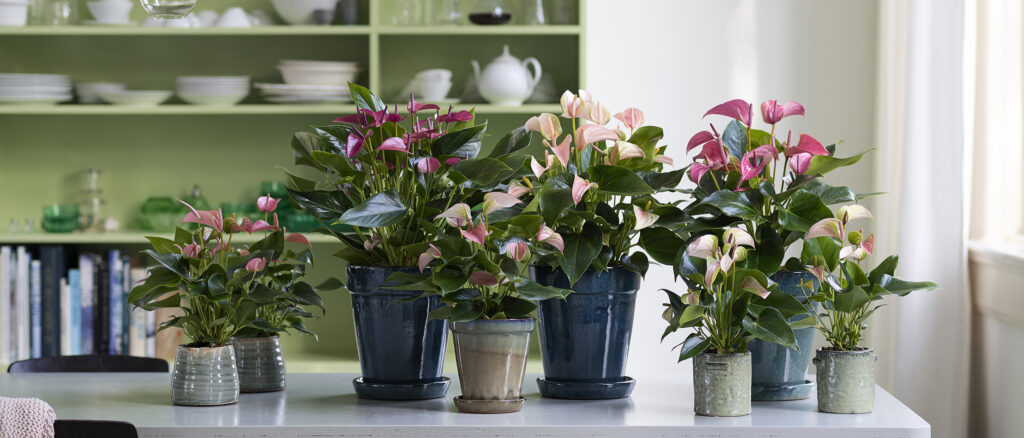Breakthrough from Dutch grower Karma Plants: the cultivation system of the future
Karma Plants. This Dutch Anthurium grower has truly earned its name. Karma, the law of cause and effect. You reap what you sow. Sustainability is therefore woven into the roots of each Anthurium. Literally, because the Grown with Waterwick cultivation system they have developed might just lead to a green evolution in the sector. Good Karma, you see.
Expanding family business
Karma Plants is Bert Langelaan’s life’s work. Founded in 2000, it has been a family business since 2007 when sons Maurice and Glenn joined the company. Due to the company’s growth, they had to move to a bigger location. Since 2018, daughter Lydia has also been active within the company as the marketing and communication manager. She learned the tricks of the trade on the island of Aruba—experience that is coming in handy for the promotion of various products. These days, Karma Plants is among the top European growers.
Continuous supply, never predictable
The secret of their success? “We continue to surprise our customers,” explains Maurice Langelaan. “We’re constantly looking for new varieties, colours and versions. This prevents customers from looking elsewhere because they have become bored with what we offer. We have the courage to take quite a few risks. For example, 10 years ago we launched a pastel-coloured Anthurium. At the time, this was absolutely not the done thing , but now it’s a trend.”
So where do they pick up on these trends? “In ‘normal’ times, at trade fairs. However, we gain most inspiration from contacts with our clients.”
The customer as a sounding board
This customer orientation is one of the company’s strengths, alongside an extensive range and continuity of production. “We sell 98% directly to clients,” explains Maurice. “We know exactly who they are and what they want. Basically, we’re not actively looking for new clients but want to optimise our service for existing clients. We’re doing this by expanding our range and offering them the right products. Sustainable growth, in other words.”
Reliable partner in tough times
This is a philosophy they share with Floréac. “We’re completely on the same wavelength. Our collaboration is also becoming increasingly intensive as a result. In addition, our focus on a distinctive range and continuity ties in seamlessly with Floréac’s clients.
It’s also thanks to Floréac that our unusual Anthuriums are sold on the French market under the well-known consumer brand ‘ SILENCE, ça pousse! ‘
Another benefit of our partnership is that it allows us to provide our clients with even better service. When the coronavirus crisis first started, Karma Plants and Floréac were perfectly attuned to each other. A lot of countries went into lockdown. For our range, that wasn’t such a big problem, as our plants have a long flowering time. Orders could simply be brought forward to a later date. As soon as delivery became possible again, we all shifted up a gear to ensure that everything could still be sent out on time.”
Cultivation system of the future
Karma Plants not only have great respect for their clients, but also great respect for the environment. Their innovative ‘Grown with Waterwick’ system makes them true pioneers in the sector. “The principle has been around for a long time, but we are the first grower to actually apply it,” says Maurice proudly. “The system is based on a capillary effect. There is a blue and white wick at the bottom of the plant. Between the bottom of the plant and the bottom of the pot, there is a layer of water in which the wick is suspended. If the plant needs water, it will suck up the necessary moisture through the wick.”
“Social media increasingly determines what consumers want to buy, rather than what’s on offer at the auction.”
Maurice Langelaan
Peat-free growing
“The wick ensures that the potting soil constantly has the ideal humidity,” Maurice continues. “This means that we’re now supplying all our Anthuriums in 9 cm pots—a significant proportion of our production—completely ‘peat-free’.. In the coming years, we want to apply this same concept across the board.
Today, many growers still use peat as potting soil because it optimally retains moisture. However, peat soils are being mined from Scandinavia or the Baltic countries and the resources are finite. This combination of transport and scarce raw materials is anything but sustainable.”
Eco-friendly
Grown with Waterwick may well be the definitive cultivation system of the future, and Karma Plants has applied for a patent for it. However, it is not the only effort the company is making in the green arena. “From this year onwards, we want to heat our greenhouses with biomass so that we only need to use natural gas for 5% of our needs, only in emergencies. We are also proud that we obtained the MPS-GAP certificate a few years ago. We use as many organic plant protection products as possible and our packaging is made of recycled cardboard.”
Welcome to the jungle
Karma Plants is therefore well on its way to emission-free and climate-neutral cultivation. How does Maurice see the future? “Positive! People from their 20s to their 40s have rediscovered the joys of plants. Just look at social media. This increasingly determines what consumers want to buy, rather than what’s on offer at the auction. We are also seeing many online communities emerge in which cuttings and maintenance tips are shared.
Another emerging trend is the jungle look. Sleek interiors with tiny plants are no longer all the rage.”
More with less
“At market level, I can also see a few shifts,” continues Maurice. “A few years ago, it was a matter of growing as much as possible. This mass production sometimes lacked a well-considered sales strategy, which greatly reduced prices. Now, this structure seems to be slowly crumbling, partly thanks to coronavirus. This is a positive development, as it encourages growers to grow more precisely and, above all, to follow customer demand—something we’ve been doing for years.”
Discover the Karma Plants assortment in our webshop

